This article was co-authored by Susannah Kerwin, ANP-BC, HNP. Susannah Kerwin is a board certified Adult Nurse Practitioner in New York, New York. With over 10 years of experience, Susannah specializes in adult primary care, holistic medicine, and women’s healthcare. Susannah holds a Bachelor’s degree from the University of San Francisco. She obtained her MSN from New York University’s (NYU) unique dual degree program combining integrative and allopathic disciplines. Prior to becoming a Nurse Practitioner, Susannah worked for more than ten years as a Registered Nurse in psychiatric and surgical settings. Susannah also serves as an adjunct faculty member for NYU.
There are 11 references cited in this article, which can be found at the bottom of the page.
This article has been viewed 876,269 times.
By your ninth month of pregnancy, you’re probably anxiously waiting for labor to start so you can meet your baby. For most women, their bodies decide the best and healthiest time to give birth, but sometimes the process needs some encouragement to get started. Doctors usually use hormones to induce labor, but you may be curious about home remedies to try yourself. Natural remedies, however, don’t have a great success rate for inducing labor. Always talk this over with your doctor or midwife first to confirm that it’s safe. Then follow their directions to induce labor safely and deliver a healthy baby.
Steps
Methods That Might Work
There are many home remedies for inducing labor on the internet. However, most of these aren't effective and could even be dangerous.[1] Luckily, the following methods have some success and should be safe, so you can see if they work for you. Remember that none of these methods are guaranteed to work, and they aren’t replacements for medically-induced labor. If your doctor says that any of these steps are dangerous, then it's best to skip them.
-
1Walk for 30 minutes a day leading up to your due date. Light physical activity is a common remedy to induce labor.[2] There isn’t much scientific evidence that it works, but a 30-minute walk each day leading up to your due date might help. Even if it doesn’t trigger labor, it could make the birthing process easier on you.[3]
- Exercise can also help build your endurance, which can make labor easier to get through.
- Staying active during your pregnancy is overall good for your and your baby’s health. Talk to your doctor about the right exercise routine for you.
-
2Stimulate your nipples to release oxytocin. This method is one of the few natural remedies that seems to work. Oxytocin is a hormone that could induce labor, and nipple stimulation releases oxytocin. Try lightly pinching your areolas between your thumbs and index fingers and rolling them for 10 minutes. You may have to repeat this for a few days in a row to see any result.[4]
- Your partner can help stimulate your nipples as well.
- There are also pumps or patches that you can use to stimulate your nipples. Ask your doctor about using one of these devices.
Advertisement -
3Have sex to stimulate contractions. Sex also releases oxytocin, which could induce contractions and labor. Research is mixed, but this method could work for you. Try having sex towards the end of your pregnancy to see if it helps.[5]
- A man's sperm contains prostaglandin, which can cause the uterus to contract. This, in turn, can stimulate labor.[6]
- Ask your doctor if sex late in your pregnancy is safe. If you have any complications, your doctor will probably tell you not to have sex.[7]
- Don’t have sex if your water has already broken because there’s a higher risk for catching an infection.[8]
-
4Try eating dates for 4 weeks before your due date. One study showed that women who ate dates during their last month of pregnancy were less likely to require medically-induced labor. It also showed higher cervical dilation in the women who ate dates compared to those who didn’t. Try eating dates in the last month of your pregnancy to see if this works for you.[9]
- One midwife recommends eating 6 dates a day leading up to your due date. Get whole dates instead of chopped ones, which are usually high in added sugar.[10]
-
5Let your doctor try membrane stripping if you've started dilating. Membrane stripping is a procedure where the doctor or midwife uses their finger to separate the baby's amniotic sac from your cervix. This could release hormones and trigger labor. It has mixed results, but this could be a way to speed the labor process along if you've already started dilating.[11]
- Don't try to perform membrane stripping by yourself. It's possible to injure yourself or cause an infection if you don't do it correctly.
-
6Avoid using any herbal remedies to induce labor. There are many other herbal remedies that proponents claim can induce labor. However, while some herbal treatments could induce labor, there isn’t enough evidence to conclude that these remedies are safe for you or your baby. Avoid them until more research is done.[12]
- Some of the most common herbal remedies include blue or black cohosh, raspberry leaf, and evening primrose. None of these are safe to use if you're pregnant.[13]
- Spicy foods and pineapple are also popular home remedies to induce labor. These don't work either, but they aren't harmful as long as they don't upset your stomach.[14]
Steps to Take Before Inducing
Inducing labor naturally isn’t right for everyone, so you need to take some steps to prepare before trying it. Most importantly, confirm that inducing labor yourself is safe for you and your baby. Only attempt it under your doctor or midwife’s guidance to ensure you and your baby are safe through the whole process.
-
1Discuss inducing labor with your doctor or midwife before trying it. Inducing labor yourself could lead to complications or risks for you or your baby. If you’re considering inducing yourself, discuss it with your doctor or midwife first so you understand all the methods and risks.[15]
- Don’t be surprised if your doctor counsels you against inducing labor yourself, since most of the methods aren’t proven to work.[16]
-
2Wait until you’re at least 37 weeks pregnant to try inducing. If you try to induce yourself before that, your baby could be born premature. Only start considering natural methods when your baby reaches full term.[17]
-
3Confirm that you or your baby don’t have any complications. Inducing labor yourself is only safe as long as you’ve had a healthy pregnancy and don’t have any complications. If you or your baby show any complications, then inducing labor yourself is dangerous.[18]
- If your baby is breech, meaning their feet are facing down, then don’t induce labor yourself.
- Also if you’ve had a previous C-section or any issues with your placenta, then inducing labor yourself isn’t safe.
-
4Don’t try to induce labor if your doctor tells you not to. There are a number of reasons that your doctor would counsel you against inducing labor yourself. If you speak with your doctor and they say trying to induce yourself is dangerous, then listen and don’t try it. This is the safest option for your and your baby.[19]
- Some reasons your doctor might forgo inducing labor include if you have low blood pressure, a compromised immune system that leaves you more susceptible to infections, or a bleeding disorder that could cause you to bleed too much during labor.[20]
Medical Takeaways
While there are many natural remedies online to induce labor, most don’t have much research behind them. Some might even be dangerous. Always follow your doctor or midwife’s guidance for the safest methods to induce labor. This way, you have the best chance for successfully delivering a healthy baby.
Expert Q&A
-
QuestionHow can I induce labor quickly?
 Susannah Kerwin, ANP-BC, HNPSusannah Kerwin is a board certified Adult Nurse Practitioner in New York, New York. With over 10 years of experience, Susannah specializes in adult primary care, holistic medicine, and women’s healthcare. Susannah holds a Bachelor’s degree from the University of San Francisco. She obtained her MSN from New York University’s (NYU) unique dual degree program combining integrative and allopathic disciplines. Prior to becoming a Nurse Practitioner, Susannah worked for more than ten years as a Registered Nurse in psychiatric and surgical settings. Susannah also serves as an adjunct faculty member for NYU.
Susannah Kerwin, ANP-BC, HNPSusannah Kerwin is a board certified Adult Nurse Practitioner in New York, New York. With over 10 years of experience, Susannah specializes in adult primary care, holistic medicine, and women’s healthcare. Susannah holds a Bachelor’s degree from the University of San Francisco. She obtained her MSN from New York University’s (NYU) unique dual degree program combining integrative and allopathic disciplines. Prior to becoming a Nurse Practitioner, Susannah worked for more than ten years as a Registered Nurse in psychiatric and surgical settings. Susannah also serves as an adjunct faculty member for NYU.
Nurse Practitioner Try getting active by taking a walk around your neighborhood. Another thing you can try is having sexual intercourse with a male, because a man's sperm contains prostaglandin. Prostaglandin causes the uterus to contract, which can stimulate labor.
Try getting active by taking a walk around your neighborhood. Another thing you can try is having sexual intercourse with a male, because a man's sperm contains prostaglandin. Prostaglandin causes the uterus to contract, which can stimulate labor.
Warnings
- Avoid taking laxatives or magnesium to induce labor, as this can be unsafe.[21]⧼thumbs_response⧽
- Castor oil is another popular folk remedy for inducing labor, but it’s more likely to cause an upset stomach and diarrhea than labor.[22]⧼thumbs_response⧽
- Studies demonstrate that almost half of women try some kind of un-prescribed method to induce labor without discussing it with their doctors first. This is dangerous, and you shouldn’t try it.[23]⧼thumbs_response⧽
References
- ↑ https://www.mayoclinic.org/healthy-lifestyle/labor-and-delivery/in-depth/inducing-labor/art-20047557
- ↑ Susannah Kerwin, ANP-BC, HNP. Nurse Practitioner. Expert Interview. 28 August 2020.
- ↑ https://health.clevelandclinic.org/truth-or-tale-8-ways-to-maybe-move-labor-along-naturally/
- ↑ https://www.ncbi.nlm.nih.gov/pmc/articles/PMC5813971/
- ↑ https://health.clevelandclinic.org/truth-or-tale-8-ways-to-maybe-move-labor-along-naturally/
- ↑ Susannah Kerwin, ANP-BC, HNP. Nurse Practitioner. Expert Interview. 28 August 2020.
- ↑ https://health.clevelandclinic.org/what-natural-ways-to-induce-labor-actually-work/
- ↑ https://www.nhs.uk/conditions/pregnancy-and-baby/induction-labour/
- ↑ https://pubmed.ncbi.nlm.nih.gov/21280989/
- ↑ https://health.clevelandclinic.org/truth-or-tale-8-ways-to-maybe-move-labor-along-naturally/
- ↑ https://health.clevelandclinic.org/truth-or-tale-8-ways-to-maybe-move-labor-along-naturally/
- ↑ https://www.ncbi.nlm.nih.gov/pmc/articles/PMC6196873/
- ↑ https://utswmed.org/medblog/truth-natural-labor/
- ↑ https://utswmed.org/medblog/truth-natural-labor/
- ↑ https://kidshealth.org/en/parents/inductions.html
- ↑ https://www.mayoclinic.org/healthy-lifestyle/labor-and-delivery/in-depth/inducing-labor/art-20047557
- ↑ https://health.clevelandclinic.org/what-natural-ways-to-induce-labor-actually-work/
- ↑ https://health.clevelandclinic.org/what-natural-ways-to-induce-labor-actually-work/
- ↑ https://kidshealth.org/en/parents/inductions.html
- ↑ https://www.mayoclinic.org/healthy-lifestyle/labor-and-delivery/in-depth/inducing-labor/art-20047557
- ↑ Susannah Kerwin, ANP-BC, HNP. Nurse Practitioner. Expert Interview. 28 August 2020.
- ↑ https://utswmed.org/medblog/truth-natural-labor/
- ↑ https://pubmed.ncbi.nlm.nih.gov/21599742/
About This Article
Before you induce labor naturally, talk to your doctor or midwife to make sure you’re healthy enough to try these methods at home. Once they approve it, try inducing labor by going for regular, 30-minute walks, since the exercise can help nudge your baby into the birthing canal. If you’re already having contractions, walking can also help speed up labor. Another way to induce labor is to have sex, since there’s some evidence that an orgasm can trigger labor. Besides having sex, you can also give yourself a breast massage, which releases a chemical in your body that can start contractions. To do this, massage your nipples for 5 minute periods throughout the day. Just don’t do this too much, since overstimulation can cause contractions that are too strong. To learn how to induce labor naturally with supplements, read more from our Medical co-author!


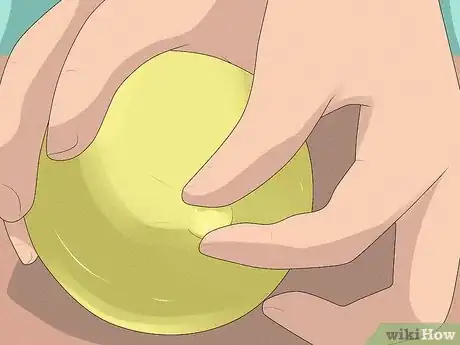
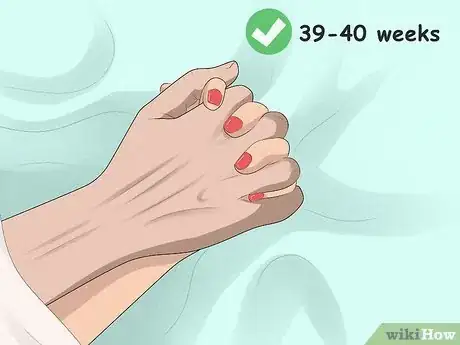

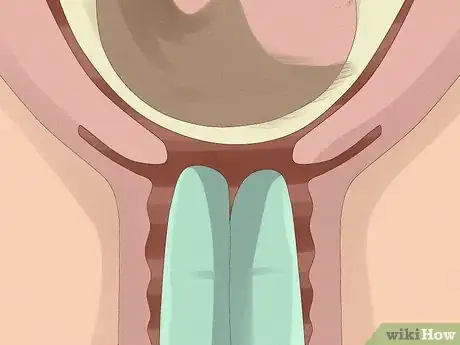
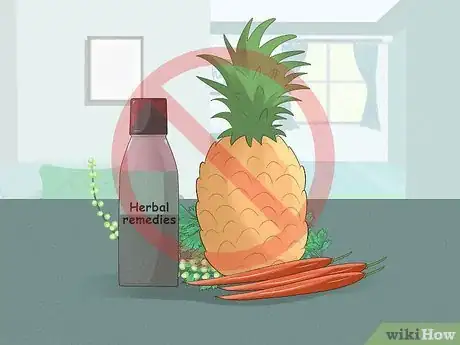








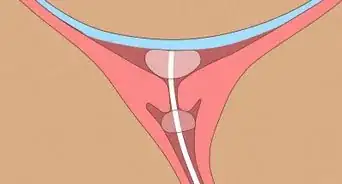























































Medical Disclaimer
The content of this article is not intended to be a substitute for professional medical advice, examination, diagnosis, or treatment. You should always contact your doctor or other qualified healthcare professional before starting, changing, or stopping any kind of health treatment.
Read More...